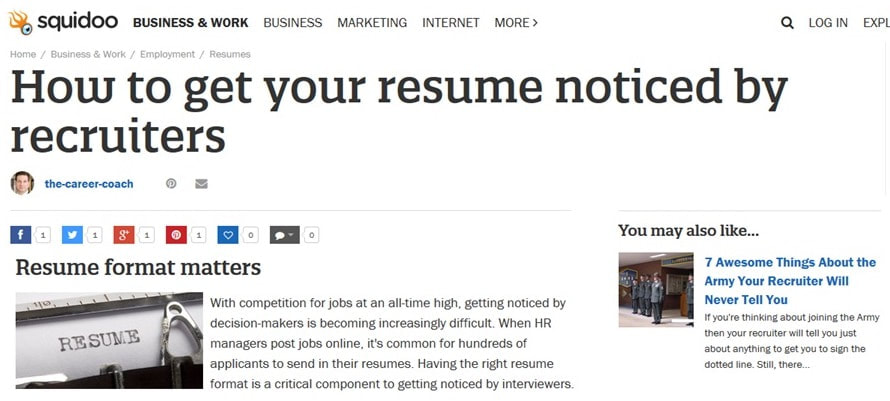How to get your resume noticed by recruiters
With competition for great jobs at an all-time high, getting noticed by the decision-makers is becoming increasingly difficult. When HR managers post jobs online, it's common for hundreds of applicants to send in their resumes for consideration. Having the right resume format is a critical component of getting noticed by the interviewers.
In an overly competitive job market with millions out of work, candidates need to be prepared better than ever when applying for jobs. As a top recruiter, I’m often surprised by how unprepared even the most experienced candidates can be.
Because the best jobs that are posted online get hundreds of applicants, job seekers need to hit a home run at each step of the placement process in order to score the job. In short, mastery of the process is absolutely essential for being able to compete in today’s job market.
It’s not uncommon for even the most experienced candidates to think that their “experience is enough” and that their “resume speaks for itself.” Resting on one’s laurels is the perfect way to sabotage a job search. Regardless of how deep and impressive one’s experience is, in this permanently over-saturated market there are always going to be candidates that are more experienced and better educated. Not to even mention eager candidates that will work for less and put in more hours off-the-clock. Like it or not, this is the new reality of the job market (aka "the new normal").
The process of being successful obviously starts with the very first step of applying for the job. Easily, the most important part because first impressions are everything. Job ads often have built-in tests to see if candidates know how to follow instructions and have attention to detail; so, if a job seeker doesn’t follow the directions, elimination from the process is immediate.
In an overly competitive job market with millions out of work, candidates need to be prepared better than ever when applying for jobs. As a top recruiter, I’m often surprised by how unprepared even the most experienced candidates can be.
Because the best jobs that are posted online get hundreds of applicants, job seekers need to hit a home run at each step of the placement process in order to score the job. In short, mastery of the process is absolutely essential for being able to compete in today’s job market.
It’s not uncommon for even the most experienced candidates to think that their “experience is enough” and that their “resume speaks for itself.” Resting on one’s laurels is the perfect way to sabotage a job search. Regardless of how deep and impressive one’s experience is, in this permanently over-saturated market there are always going to be candidates that are more experienced and better educated. Not to even mention eager candidates that will work for less and put in more hours off-the-clock. Like it or not, this is the new reality of the job market (aka "the new normal").
The process of being successful obviously starts with the very first step of applying for the job. Easily, the most important part because first impressions are everything. Job ads often have built-in tests to see if candidates know how to follow instructions and have attention to detail; so, if a job seeker doesn’t follow the directions, elimination from the process is immediate.
Submitting a customized resume is absolutely critical to landing an interview
The old-school method of having one generic resume that is blasted to each job is a sure-fire way not to get an interview. That may have worked in the 80s and 90s but will surely get candidate ignored in today’s difficult job market. Employers are savvy and they know when candidates are sending generic resumes. By doing that, in essence, you’re telling the employer you don’t really care that much about the job. If you want to go the extra mile, then do the extra work and customize the resume.
Regardless of whether the job ad has been posted directly by the employer or through an employment agency, the job description is going to have key words that are specific to that job; so, it is the candidate’s responsibility to place those key words in the resume (i.e., calendar management or staff training).
Because hundreds or even thousands of resumes are submitted for some jobs, computers sort the data and if those important key words are not in the resume, it will get deleted. Additionally, the candidate must highlight the skills they have to match what’s listed in the job description. So, for example, if the job calls for an ability for an executive assistant to have deep experience booking personal travel plans for the boss, then the resume will need to reflect that.
Interviewing has become a game in psychological warfare as well. It’s not enough to just have the skills to accomplish the job because employers can be ultra-selective, so they want to “feel the magic” in the interview. They want to know the candidate can fit in with the corporate culture and that they are a team player. Therefore, displaying the right balance of can-do attitude and confidence is an important part of the game. One doesn’t want to appear overly eager or too confident because that can be a turn-off to employers as well.
Going into an interview is like an audition for actors; the more prepared the job seeker is, the better. Many candidates are just going to wing-it in the interview. A sure-fire way to outshine the other applicants is to make sure the right amount of homework and rehearsal has gone into the interview. In short, you should overprepare. Because jittery nerves can take over in an interview, the candidate can combat that by being very well prepared.
Regardless of whether the job ad has been posted directly by the employer or through an employment agency, the job description is going to have key words that are specific to that job; so, it is the candidate’s responsibility to place those key words in the resume (i.e., calendar management or staff training).
Because hundreds or even thousands of resumes are submitted for some jobs, computers sort the data and if those important key words are not in the resume, it will get deleted. Additionally, the candidate must highlight the skills they have to match what’s listed in the job description. So, for example, if the job calls for an ability for an executive assistant to have deep experience booking personal travel plans for the boss, then the resume will need to reflect that.
Interviewing has become a game in psychological warfare as well. It’s not enough to just have the skills to accomplish the job because employers can be ultra-selective, so they want to “feel the magic” in the interview. They want to know the candidate can fit in with the corporate culture and that they are a team player. Therefore, displaying the right balance of can-do attitude and confidence is an important part of the game. One doesn’t want to appear overly eager or too confident because that can be a turn-off to employers as well.
Going into an interview is like an audition for actors; the more prepared the job seeker is, the better. Many candidates are just going to wing-it in the interview. A sure-fire way to outshine the other applicants is to make sure the right amount of homework and rehearsal has gone into the interview. In short, you should overprepare. Because jittery nerves can take over in an interview, the candidate can combat that by being very well prepared.
Last, but certainly not least, is the thank you note after the interview
Yet another area where candidates drop the ball is sending a thank you note. Sending a thank you email is better than not sending anything at all, but an old-fashioned thank you note is best. I suggest going to a specialty store and buying the most expensive thank you note they have -- even if it cost $5. Have that note with you in the interview, so afterwards it can be filled out and given to the receptionist. This technique is especially helpful if the employer is in a hurry to make a decision because mailing the card can take a day or two -- and that may be too late.


